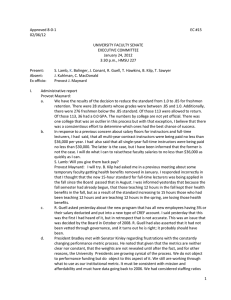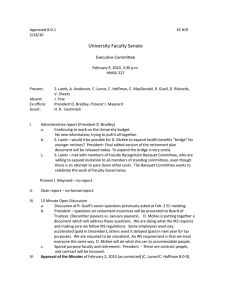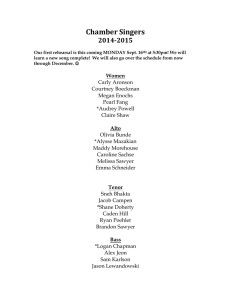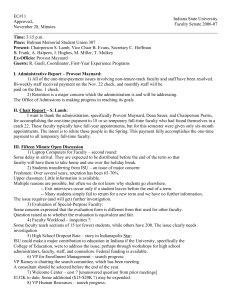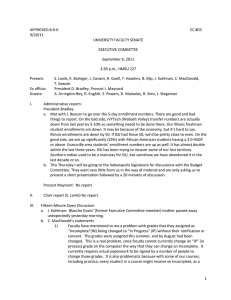Approved 1/17/12 EC #13 9-0-0
advertisement
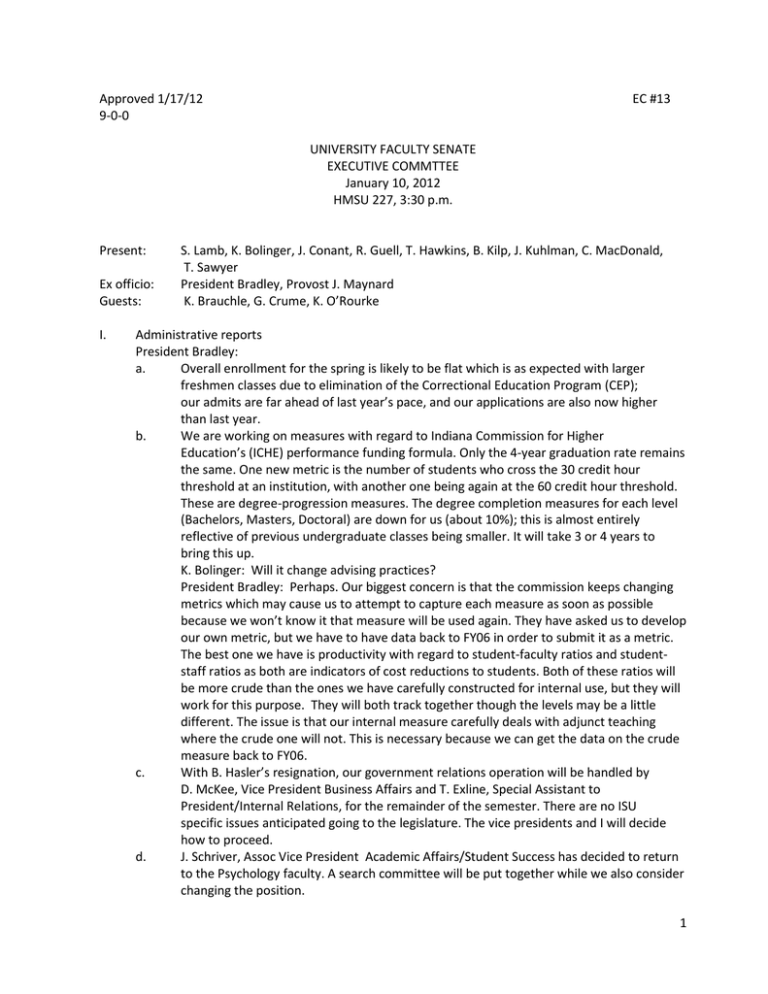
Approved 1/17/12 9-0-0 EC #13 UNIVERSITY FACULTY SENATE EXECUTIVE COMMTTEE January 10, 2012 HMSU 227, 3:30 p.m. Present: Ex officio: Guests: I. S. Lamb, K. Bolinger, J. Conant, R. Guell, T. Hawkins, B. Kilp, J. Kuhlman, C. MacDonald, T. Sawyer President Bradley, Provost J. Maynard K. Brauchle, G. Crume, K. O’Rourke Administrative reports President Bradley: a. Overall enrollment for the spring is likely to be flat which is as expected with larger freshmen classes due to elimination of the Correctional Education Program (CEP); our admits are far ahead of last year’s pace, and our applications are also now higher than last year. b. We are working on measures with regard to Indiana Commission for Higher Education’s (ICHE) performance funding formula. Only the 4-year graduation rate remains the same. One new metric is the number of students who cross the 30 credit hour threshold at an institution, with another one being again at the 60 credit hour threshold. These are degree-progression measures. The degree completion measures for each level (Bachelors, Masters, Doctoral) are down for us (about 10%); this is almost entirely reflective of previous undergraduate classes being smaller. It will take 3 or 4 years to bring this up. K. Bolinger: Will it change advising practices? President Bradley: Perhaps. Our biggest concern is that the commission keeps changing metrics which may cause us to attempt to capture each measure as soon as possible because we won’t know it that measure will be used again. They have asked us to develop our own metric, but we have to have data back to FY06 in order to submit it as a metric. The best one we have is productivity with regard to student-faculty ratios and studentstaff ratios as both are indicators of cost reductions to students. Both of these ratios will be more crude than the ones we have carefully constructed for internal use, but they will work for this purpose. They will both track together though the levels may be a little different. The issue is that our internal measure carefully deals with adjunct teaching where the crude one will not. This is necessary because we can get the data on the crude measure back to FY06. c. With B. Hasler’s resignation, our government relations operation will be handled by D. McKee, Vice President Business Affairs and T. Exline, Special Assistant to President/Internal Relations, for the remainder of the semester. There are no ISU specific issues anticipated going to the legislature. The vice presidents and I will decide how to proceed. d. J. Schriver, Assoc Vice President Academic Affairs/Student Success has decided to return to the Psychology faculty. A search committee will be put together while we also consider changing the position. 1 Provost Maynard: a. The Affordability Taskforce is finishing up its work with the Instruction subcommittee (led by J. Murray); the Books and Supplies subcommittee (led by R. Guell); the Housing and Dining subcommittee (led by J. Beacon) and the Facilities and Administration subcommittee (led by D. McKee); each are about to submit their respective reports. The Taskforce report will be completed by the end of January for presentation at the February Board of Trustees meeting. b. Legislature: There is a bill circulating in the legislature to create a transfer core module which would require that, for the list of courses, every state institution name and number select courses in an identical fashion (e.g. College 101 will be called 101 everywhere). D. Bradley: There is also a movement (not yet a bill) to restrict bachelor’s degrees to 120 credit hours and another to grant the ICHE the power to limit tuition increases by institution (will be on a campus by campus basis, not just statewide.) II. Chair report, S. Lamb: a. I appreciate the Affordability Taskforce subcommittee reports of J. Murray and R. Guell and recognize the need to submit portions of their recommendations through governance. b. Questions to Provost Maynard: What percent of those first-year students who fell below the new .85 standard were allowed to return? Provost Maynard: I do not know but will ask. There has been much discussion of a University/College proposal. S. Lamb: How far along is that discussion? Provost Maynard: The discussions are not that far along. However, we continue to give serious consideration to the Faculty Senate a proposal along the lines of a University College in a fashion consistent with the TAFFY report that resulted from the Foundation of Excellence process. S. Lamb: We know that deans have received the high-DWF report. Have they been charged with doing anything specific with it? Provost Maynard: They (deans and chairs) have been asked to look the data and to discuss it within the College leadership. There have been conversations about anecdotes. III. Fifteen Minute Open Discussion a. B. Kilp: Is it true that any temporary faculty that are not teaching 15 hours have lost health benefits? Provost Maynard: There are temporary faculty who may have been teaching 12 hours in previous years who had health benefits who lost them if their assignment was not made consistent with the definition of full-time; that is 15 credit hours or its equivalent. I worked with the deans to give them about half of the FTE slots as full-time positions. Those temporary faculty maintained health benefits. Full-time instructors on multiyear contracts also got retirement benefits. We limited the number of these benefitseligible faculty to stay within our budget so there may be some faculty who had been teaching 12 hours and are once again teaching 12 hours who lost health benefits. We will continue to adjust the numbers as enrollments warrant. B. Kilp: The loss of those benefits created a negative feeling among these faculty. They were not told by the chairperson but instead learned through a letter from staff benefits. 2 b. c. d. Provost Maynard: I understand. The chairperson should have informed them if he/she did not. President Bradley: We need to look at the credit hours for all temporary faculty. I am concerned that we are creating accidental fulltime employees by having them teach a few hours here and a few hours there. Moreover, we probably have some who are teaching 25 or more credit hours if you look at all of the courses they are teaching for all of the schools for whom they are working. They can’t be giving our students what we want them to give if they are teaching that much. T. Sawyer: The city is partially succeeding by moving the birds and their resulting excrement from downtown, but it’s at a cost to those who park on the North side of the track and field facility. The parking lot is filthy. D. Bradley: I ask will Kevin Runion (Assoc. VP of Facilities Management) about getting the lot clean. J. Conant: As we have been talking about retention, I would like to see the administration be charged with producing a retention report for SAC so that SAC can render an annual report evaluating the success (or failure) or particular retention programs. C. MacDonald: The Handbook clearly and unambiguously calls for the Council of Governance Chairs to meet three times per year. They have not. S. Lamb: You are correct. This has not happened, though perhaps occasionally attempted. I will rectify that. R. Guell: The Handbook also states that the University will provide for 75% of the cost of providing health benefits. Given that the Board of Trustees has indicated that they wish that to be 67%, this needs to be fixed. IV. MOTION TO APPROVE the Minutes of December 6, 2011 (T. Sawyer, J. Conant; Vote: unanimous) V. Report from Dr. Gene Crume, President, ISU Foundation, concerning Capital Campaign: The “March On” campaign exceeded its goal of $85 million and is slated to bring in $86.7 million. There were 17 gifts of $1 million or more. The majority of that was in cash. The faculty and staff campaign increased, in terms of participation, from 18% of the employees to 29%. Thank you for all of your support both to faculty/staff. There were more than 18,000 total donors. Online giving has tripled in 2 years despite significant headwinds (the economy, a presidential transition, all new Deans, and almost an entire turnover of athletic coaches. It is clear we have developed a deep bench on the Foundation staff, and a recognized brand in terms of “March ON.” We have also uncovered people and organizations that we can go to for ISU’s “First, Second Campaign.” There are two upcoming events. On January 20, we will be giving several awards, including a legacy award to the Butwin family, who through generations have 35 ISU graduates. We will also recognize Chris Pillow as well as the “ugly sweater” alums. In April we will be giving other Philanthropy awards. Questions? S. Lamb: Does the Network funds count in the $87+million? 3 G. Crume: The only things that counted were the gifts that we had secured or confirmed pledges. Investments have come from literally around the country (e.g. OSHA in San Francisco). No other questions. S. Lamb: Thank you very much for all your efforts. VI. Senate Motion concerning Change of Grades (which was tabled at the last Senate Meeting) “Change the grading system to the following: A, A-, B+, B, B-, C+, C, D, F. The A+ is removed, as is the C-, and the D+, and the D-.” MOTION TO APPROVE: (K. Bolinger/T. Hawkins; vote 7-2-0) Discussion: S. Lamb: Why not keep the A+? K. Bolinger: It doesn’t get anything other than pride. T. Sawyer: A C- does not transfer or count to graduate school. Provost Maynard: The C- is considered a failing grade in the College of Education and in Nursing. T. Sawyer: The problem is not everyone uses the same metric and as a result there is significant inconsistency. Moreover the A- has effectively killed the 4.0s. K. Bolinger: We need to work more with faculty education and think less about mandating consistency. C. MacDonald: The blowback on standardization would be enormous. B. Kilp: I got rid of all my minuses J. Kuhlman: I did too. R. Guell: Do we know what Fall GPA was? Provost Maynard: No. VII. Motion from CAAC, Approving Distance Education Report. Approved/endorse by CAAC 7-0-0) K. Brauchle: Review/discussion. MOTION TO ENDORSE AND RECOMMEND IMPLEMENTATION OF THE DISTANCE ED TASK FORCE REPORT (J. Kuhlman, T. Sawyer; vote: unanimous) VIII. Two Completed Charges from FAC, one concerning SIR’s, the other Performing Arts Committee, Dr. J. West, Recommendation (1): We recommend that the Executive Committee charge FAC and SAC with undertaking a review of current rules governing course evaluation policies and practices at department and college levels. MOTION TO APPROVE recommendation 1 as above stated (T. Sawyer/C. MacDonald; Vote: unanimous) Recommendation (2): We recommend that the ESIR should be generally available at the discretion of individual faculty; the rules governing access were constructed to manage the cost associated with administration. Given the absence of a calculus of labor costs in the paper SIR administration estimate, we find that costs are likely to be comparable between the two formats. MOTION TO APPROVE Recommendation 2 as stated above (T. Sawyer/ C. MacDonald; vote: unanimous) 4 Recommendation (3) Further Recommendation on Access to data: Apart from aggregate data, no data shall be shared except with the responsible faculty member. MOTION TO TABLE C. MacDonald (T. Sawyer/B. Kilp vote: unanimous) Recommendation (4) Change Handbook language as it relates to the Performing Arts Series Committee. 270. Performing Arts Series Committee. The Performing Arts Series Committee advises on the selection of the all-University performing arts series programs. 270.4.1 Membership. There are two (2) faculty, two (2) administrative/professional staff, one (1) support staff, two (2) students and one (1) community representatives. Civility Statement MOTION TO APPROVE Recommendation 4 as stated above (T. Sawyer/K. Bolinger, unanimous) IX. MOTION TO CHARGE FAC with Evaluating a Civility Statement drafted by the Deans’ Council (T. Sawyer/ J. Kuhlman vote: 7-2-0) statement as follows: Indiana State University values civility in the classroom and in the workplace. As a result, the campus community is collectively committed to working toward the goal of creating and maintaining a civil community. To that end, each member of the campus community must: respect the rights of others; interact professionally at all times with students, staff, and faculty, and be courteous towards faculty, staff, students, clients, and visitors. To that end, disruptive, discourteous and/or insubordinate conduct will not be tolerated and members of the University community must: not engage in conduct that causes or threatens harm to others; not engage in persistent unwanted behaviors; and Not engage in conduct that intentionally or through carelessness creates an unprofessional and/or unproductive learning, working, or living environment. Note: Announcement: ISU Dean’s Council (Jan. 2012) X. MOTION TO MOVE INTO EXECUTIVE SESSION 4:55 p.m. (T. Sawyer/J. Kuhlman, vote: 8-0-0) MOTION TO MOVE OUT OF EXECUTIVE SESSION 5:15 p.m. (K. Bolinger/T. Sawyer, vote: 8-0-0) MOTION TO ENDORSE Formal Response to letter dated December 9, 2011 pertaining to grievance as amended. K. Bolinger/T. Sawyer 8-0-0. XI. Additional monies for URC and UAEC, informational item. Pertaining to Letter from Mark Green dated November 22, 2011 regarding F&A Allocations to the University Research Committee and the University Arts Endowment Committee. a. Question: Will we be doubling the money as the memo suggests? Or, is this a typo? 5 b. Will continue discussion at next Executive Committee meeting on Tuesday, January 17. John Conant asked to determine the accuracy of this memo. Meeting adjourned: 5:20 p.m. 6
